To: Blake Foley
From: Sean Gandert
Subject: RE: The Phantom Sequel
Theoretically, I would always have games make an attempt at telling their stories through gameplay—after all, that’s why we’re here, right? Playing through a story is different from reading it or watching it, and we want games to reflect this fact. I sit down in order to do something, to experience something, to feel a certain form of low-level empowerment. In reality, though, there turn out to be quite a few exceptions, and a poorly implemented piece of supposedly cinematic gameplay can’t help but be terrible. Your example was a good one, but beyond that I think the Metal Gear series as a whole is a testament to the fact that what we call games aren’t all play, they’re mixed media. Even Metal Gear 2 has what are essentially cut scenes, e.g. the time you wait while Running Man makes his sad lap around his little enclosure. There’s no one right way to tell a story, but there are many more wrong ones, and I have a pretty bad history with those cool moments where games try to make you feel like a badass. I feel like the snake puzzle slightly misfires in using gameplay to tell us what’s happening here, but only a little bit, and by using the logic of 8-bit games in an odd new way I still liked it for what it was. Its counterintuitive nature, the way it’s not like any other game, is a lot of its charm.
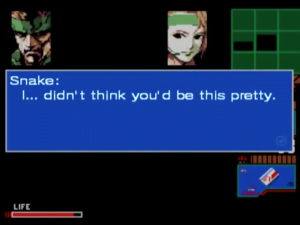 But I want to stay on the subject of the story and characters here, with particular emphasis on the weird recurring ones. That includes Snake himself, who has more personality here than before… but not a ton. His most distinguishing trait as a character is the way he likes to repeat what people said to him for confirmation, and it’s difficult to tell whether this is sometimes meant as a joke or not. But beyond that, we still don’t have a ton of connection with him, though there are hints he’s a bit eccentric. Snake is still a complete stand-in for the player, which is what makes the game’s romance storyline so weird. Gustava Heffner has a lot of backstory, but she’s almost completely blank, and the entire plot revolving around her and Snake was both enjoyable and clumsy. Why would she fall in love with him, considering that he says nothing remotely clever or interesting? Rather, he just kind of appears, and because her role is that of a love interest, she falls for him through no action of your own. In a way, it’s the opposite of what you mentioned—this time cut scenes fall flat because they lack any sort of action on the player’s part that would make things believable. Their romance, as I guess I want to call it that, had a sort of campy charm to it, but I don’t think anyone would argue it was good. It felt kind of like the storytelling to a Roger Corman flick, with really broad types and perhaps intentional over-determination.
But I want to stay on the subject of the story and characters here, with particular emphasis on the weird recurring ones. That includes Snake himself, who has more personality here than before… but not a ton. His most distinguishing trait as a character is the way he likes to repeat what people said to him for confirmation, and it’s difficult to tell whether this is sometimes meant as a joke or not. But beyond that, we still don’t have a ton of connection with him, though there are hints he’s a bit eccentric. Snake is still a complete stand-in for the player, which is what makes the game’s romance storyline so weird. Gustava Heffner has a lot of backstory, but she’s almost completely blank, and the entire plot revolving around her and Snake was both enjoyable and clumsy. Why would she fall in love with him, considering that he says nothing remotely clever or interesting? Rather, he just kind of appears, and because her role is that of a love interest, she falls for him through no action of your own. In a way, it’s the opposite of what you mentioned—this time cut scenes fall flat because they lack any sort of action on the player’s part that would make things believable. Their romance, as I guess I want to call it that, had a sort of campy charm to it, but I don’t think anyone would argue it was good. It felt kind of like the storytelling to a Roger Corman flick, with really broad types and perhaps intentional over-determination.
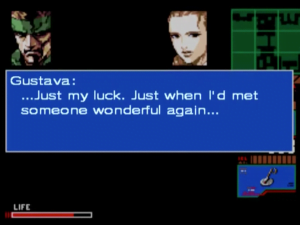 Here’s a sample line of dialogue from their whirlwind pseudo-fling in the jungle: “No, I mean us… A world-renowned scientist, a former Olympic athlete, and an ex-special agent, trudging together through a sewer…” You get the feeling that Kojima knows this is ridiculous and is trying to amp that aspect up rather than making the dialogue more reasonable. I know that John Carpenter was a big influence on Kojima, and in a lot of ways it feels like there’s a Big Trouble in Little China aspect of knowing ridiculousness seeping into the story. We’re supposed to understand that this is typage and cliche, but at the same time it’s not a wink at the camera sort of thing, which is why I think of Big Trouble. It’s stupid, and knowingly stupid, but it’s also serious about this and wants to do everything correctly. There’s no laziness here, it’s just that the director could do something else and instead wanted things to float into the realm of melodrama.
Here’s a sample line of dialogue from their whirlwind pseudo-fling in the jungle: “No, I mean us… A world-renowned scientist, a former Olympic athlete, and an ex-special agent, trudging together through a sewer…” You get the feeling that Kojima knows this is ridiculous and is trying to amp that aspect up rather than making the dialogue more reasonable. I know that John Carpenter was a big influence on Kojima, and in a lot of ways it feels like there’s a Big Trouble in Little China aspect of knowing ridiculousness seeping into the story. We’re supposed to understand that this is typage and cliche, but at the same time it’s not a wink at the camera sort of thing, which is why I think of Big Trouble. It’s stupid, and knowingly stupid, but it’s also serious about this and wants to do everything correctly. There’s no laziness here, it’s just that the director could do something else and instead wanted things to float into the realm of melodrama.
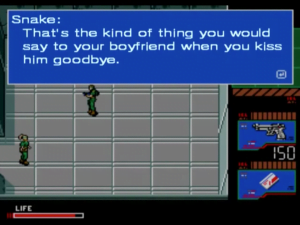 Speaking of which, Gustava is a pretty bad character regardless of any of this, given that her chief traits are being a damsel in distress, falling in love with Snake, and dying. She doesn’t even get to show off her skating prowess (I would love it if she skated around a rink a la Running Man), instead she’s just there to get killed for pathos. To me, she’s a pretty straightforward case of a Women in Refrigerator, and it doesn’t help that she’s one of only two women in the game, the other being Holly White, who also requires rescuing by Snake along the way. Holly’s slightly more spunky than Gustava, but she’s nonetheless given a very cliched sidekick sort of role. While Gustava and most other characters are overdeveloped, given wonderfully insane and completely unnecessary details about their backstories, she’s underdeveloped and weirdly unmemorable. The best that can be said about her portrayal is that she’s slightly better than Gustava, but beyond that she just recedes into your mind as “some girl.” She manages to be the least interesting character in the game for me.
Speaking of which, Gustava is a pretty bad character regardless of any of this, given that her chief traits are being a damsel in distress, falling in love with Snake, and dying. She doesn’t even get to show off her skating prowess (I would love it if she skated around a rink a la Running Man), instead she’s just there to get killed for pathos. To me, she’s a pretty straightforward case of a Women in Refrigerator, and it doesn’t help that she’s one of only two women in the game, the other being Holly White, who also requires rescuing by Snake along the way. Holly’s slightly more spunky than Gustava, but she’s nonetheless given a very cliched sidekick sort of role. While Gustava and most other characters are overdeveloped, given wonderfully insane and completely unnecessary details about their backstories, she’s underdeveloped and weirdly unmemorable. The best that can be said about her portrayal is that she’s slightly better than Gustava, but beyond that she just recedes into your mind as “some girl.” She manages to be the least interesting character in the game for me.
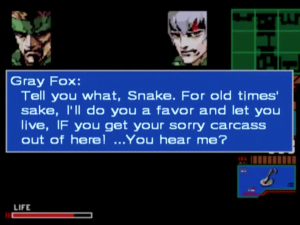 Like you, I found Grey Fox to be a pretty big non-starter. He was far more interesting as Snake’s #1 Fan than as a character himself, and because he was such a non-entity in Metal Gear his betrayal is essentially meaningless. I’m kind of glad it’s part of the story, though, because it continues the series’ motif of constant betrayals (we should talk about what this means later on, once we’ve had a few more of these, as I think it’s a fascinating part of Metal Gear), but as for the man himself I just don’t give a damn. Schneider is someone you had contact with, so his betrayal is related to actual character. Before we move on, I also wanted to offer a short list of jobs Kyle Schneider has had just in these two games: architect of Outer Heaven, leader of the Zanzibar Resistance movement, member of NASA’s Extraterrestrial Environment Special Forces Unit, and ninja. Apparently he’s kind of the Forrest Gump of the MSX Metal Gear games, in every job at every point in time, even if they make absolutely no sense. Snake should not be able to beat him in a fight, he’s a space-ninja!
Like you, I found Grey Fox to be a pretty big non-starter. He was far more interesting as Snake’s #1 Fan than as a character himself, and because he was such a non-entity in Metal Gear his betrayal is essentially meaningless. I’m kind of glad it’s part of the story, though, because it continues the series’ motif of constant betrayals (we should talk about what this means later on, once we’ve had a few more of these, as I think it’s a fascinating part of Metal Gear), but as for the man himself I just don’t give a damn. Schneider is someone you had contact with, so his betrayal is related to actual character. Before we move on, I also wanted to offer a short list of jobs Kyle Schneider has had just in these two games: architect of Outer Heaven, leader of the Zanzibar Resistance movement, member of NASA’s Extraterrestrial Environment Special Forces Unit, and ninja. Apparently he’s kind of the Forrest Gump of the MSX Metal Gear games, in every job at every point in time, even if they make absolutely no sense. Snake should not be able to beat him in a fight, he’s a space-ninja!
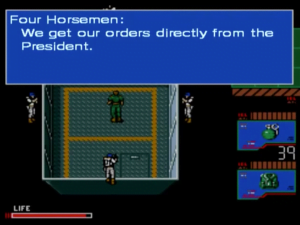 I mentioned the bosses to you earlier because I thought that in every way they were a big step up from the gang in Metal Gear. Shotmaker and Machinegun Kid were kind of depressing in their lack of creativity (umm… your chief distinguishing trait is that you own a machine gun?). They were all so video game-y, like the Robot Masters in a Megaman game. Conversely, Metal Gear 2 features not just the overwhelmingly backstoried Schneider, but also Running Man, the hit squad in an elevator, and the puzzle battle with Big Boss himself. With the exception of Jungle Evil and Night Fright being essentially redundant as far as I was concerned, boss battles were far more memorable and had a great deal of character. Machinegun Kid is just a guy with a gun, but Jungle Evil wiped out two companies on his own in Yemen and Vietnam. It felt like a reward just to fight them, and I looked forward to their goofy introductions and elaborate gimmicks. Each boss was an experience, and while I spent plenty of time solving arcane puzzles and sneaking around the compound, setpieces have begun to ramp up as much more of a key focus than in the original.
I mentioned the bosses to you earlier because I thought that in every way they were a big step up from the gang in Metal Gear. Shotmaker and Machinegun Kid were kind of depressing in their lack of creativity (umm… your chief distinguishing trait is that you own a machine gun?). They were all so video game-y, like the Robot Masters in a Megaman game. Conversely, Metal Gear 2 features not just the overwhelmingly backstoried Schneider, but also Running Man, the hit squad in an elevator, and the puzzle battle with Big Boss himself. With the exception of Jungle Evil and Night Fright being essentially redundant as far as I was concerned, boss battles were far more memorable and had a great deal of character. Machinegun Kid is just a guy with a gun, but Jungle Evil wiped out two companies on his own in Yemen and Vietnam. It felt like a reward just to fight them, and I looked forward to their goofy introductions and elaborate gimmicks. Each boss was an experience, and while I spent plenty of time solving arcane puzzles and sneaking around the compound, setpieces have begun to ramp up as much more of a key focus than in the original.
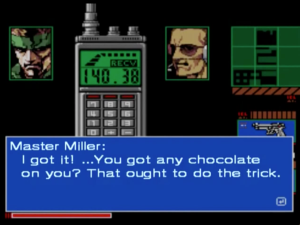 As far as the supporting team goes, most of them were surprisingly bland. Because of this, the codecs were strangely game-ier than last time; I tended to use them for useful information, not for strange dialogue where Big Boss tells me patronizing tidbits about equipment I should already know how to use. The exceptions to this were the aforementioned #1 Fan, which I thought worked very well in the story, and Master Miller. Miller seems like a complete psychopath, and that he’s Snake’s mentor reveals more about Snake than perhaps anything else in the game. I can’t leave without offering a few of my favorite Miller quotes:
As far as the supporting team goes, most of them were surprisingly bland. Because of this, the codecs were strangely game-ier than last time; I tended to use them for useful information, not for strange dialogue where Big Boss tells me patronizing tidbits about equipment I should already know how to use. The exceptions to this were the aforementioned #1 Fan, which I thought worked very well in the story, and Master Miller. Miller seems like a complete psychopath, and that he’s Snake’s mentor reveals more about Snake than perhaps anything else in the game. I can’t leave without offering a few of my favorite Miller quotes:
“When replenishing your fluids, you shouldn’t drink any more than 100 cc’s at a time. When it absorb’s fluids, your body burns an amount of energy equal to the temperature difference between your body and the fluid. That’s because it has to raise the fluid’s temperature to match your body’s temperature. It also makes your blood thinner, slowing your brain functions. So don’t drink too much soda while you’re playing…Over and out.
“You should wait 30 minutes after eating before playing games. The blood flow shifts to your stomach, and your brain doesn’t function as quickly. That’s when your attention level is at its lowest. So you should wait 30 minutes after eating, before you start playing…Over and out.
“When faced with a difficult task, just tell yourself, I can do it, and do it. Imagine how happy you’ll be when you succeed. Don’t picture the GAME OVER screen, even if you make a mistake. Keep your spirits high, and use the power of positive thinking. …Over and out.”
And I can’t forget true masterpiece that is:
“You can drink your own saliva, but never spit it out. The enemy can tell how tired you are by looking at the saliva on the ground or on plants. They can even estimate how long ago you were there. So don’t spit in public. It’s a dangerous habit…Over and out.”
Sure, he gives useful advice a handful of times, but mostly he’s there to be aggressively weird, and not just in self-referential ways. I liked Miller for being something you wouldn’t find in any other video game, mostly because no one would want to put in the amount of work to make him a character when you could easily give all of his useful dialogue to, say, Holly instead. He’s there just for flavor, which I know is something we keep harping on about, but it’s why the game is so rich and fun to both think about and play. He’s essential to the game’s tone, but nothing else; it would be a lesser game without him, yet nothing would be fundamentally changed.
There are a few topics I haven’t gotten to, but maybe you can nail them before we wrap this up. One thing is that we haven’t really addressed the game’s intro. The Madnar/Gustava scene in the hallway is cinematic in a way (or at the very least it’s not particularly gamematic, which is a terrible word I just made up and should be thrown off the site for using), but it’s nothing like the opening of Metal Gear 2 that signals such grand ambition for what’s to come. And I also still want to talk about the orphans. I don’t have much to say about them beyond that they’re weird and make no sense—there are orphans locked in rooms without visible doors, for God’s sake, and no one seems to have a problem with this—but maybe you have some more intelligent thoughts on the subject. Now it’s time for me to start adjusting to the third dimension. If it’s anything like the first two, I’m guessing it’ll be pretty sweet.
-Sean




